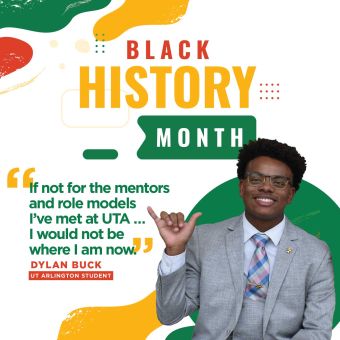Dylan Buck
UT Arlington, Senior Student Body Vice President, 2022-23
Born and raised in St. Louis, Dylan found himself adjusting to a new life in North Texas as a senior in high school after his parents moved to take on new job opportunities. He chose to attend UT Arlington and has made the most of his time on campus. A senior and double-major in Political Science and Music Industry Studies, Dylan currently serves as the Student Body Vice President and was voted 2022 Homecoming King. He aspires to be an attorney and then run for public office “to help our cities and communities thrive and become more equitable and inclusive.”
As we celebrate Black History Month, a time to honor the triumphs and struggles of African Americans throughout U.S. history, what is foremost on your mind?
As a young Black man in college who wants to become a lawyer, the accomplishments and tribulations of African Americans throughout American history are foremost on my mind. Recognizing and honoring the sacrifices and accomplishments of those who came before us is crucial. Examples include the abolishment of slavery, the Civil Rights Movement, the desegregation of higher education institutions and the contributions of African Americans to fields like science, technology, the arts and politics. These successes would not have been possible without the unwavering commitment and tenacity of countless people who fought for justice and equality in the face of overwhelming opposition.
While immense progress has been made, it is critical to realize that repercussions from centuries of systemic racism still exist and that the fight continues. In many facets of society, systemic inequalities have shifted to systemic inequities. Disparities in employment, healthcare, education and the criminal justice system are only a few examples. We must keep pushing for diversity, equity and inclusion in all facets of life to build a more just and equitable society for all.
As a prospective attorney, I intend to use my abilities and knowledge to promote the rights of underrepresented groups and work to build a more just society. This is the way I intend to pay tribute to African Americans' victories and hardships throughout American history.
Black males are underrepresented on college campuses across the country. What barriers must be removed to increase the enrollment of Black males?
I believe the education system is fundamentally not designed to enable the success of Black and other minority students. Because property taxes in Texas are used to support our educational system, poorer communities contribute less money to their local schools. That leads to a lack of resources, inadequate infrastructure and underfunded programs, making it challenging for students from these communities to achieve early academic success. That negatively impacts these students’ ability to build a foundation of education and later to attend college.
Another barrier facing Black males is a lack of representation and support infrastructure within the education system itself. Black students are frequently underrepresented in programs that prepare them for college and are less likely to have access to mentors, counselors and other resources that can help them succeed in their studies. To foster an inclusive and equitable environment for all students, regardless of race or socioeconomic status, we must continue to address these issues and work toward building a stronger public educational system. To achieve this, it is necessary to address disparities in school funding, support services and representation to eradicate systemic racism in the educational system. We must keep funding initiatives that assist minority students and build pathways to increase success in higher education.
Among Black males who do attend college, only 36% complete a bachelor's degree within six years, according to the National Center for Education Statistics. What can colleges and universities do better to retain and graduate Black male students?
I have seen firsthand the challenges many Black men face in college. I believe there are several initiatives that institutions of higher learning can take to enhance the Black male experience on campus. Colleges and universities must highlight the distinctive backgrounds and accommodations of diverse students. Many colleges across the nation, including UT Arlington, actively seek minority students and promote diversity as a selling point. However, only some universities value the on-campus experiences of these students. This is unfortunate because many students have distinctive backgrounds and experiences that require specialized services. For instance, many Black students come from low-income families and might require extra financial assistance to succeed in college. Without it, many have no choice but to work to support themselves in addition to going to school, negatively impacting the amount of time students can give, not only to their studies, but to participating in extracurricular activities that enhance the college experience. Universities must offer support services that Black male students and other underrepresented groups need to ultimately be successful in college.
The success of students depends on Student Affairs just as much as it does on their academics. The importance of supporting students, assisting them in adjusting to college life, preparing them for the workforce and encouraging student engagement cannot be understated. It is also imperative that universities employ a diverse faculty and staff so Black students, and other minority students, have access to mentors, people who look like them and share similar backgrounds. Black male students who can look up to professors and others in leadership positions as role models can make all the difference. I speak from firsthand experience. If not for the mentors and role models I’ve met at UTA -- the successful Black men and women who inspired me and pushed me to strive to be great every day -- I would not be where I am now. People like Dr. Relius Johnson, Director of New Maverick Orientation, Shabaz Brown, Director of the Office of Cultural Engagement and Social Change and Harold Brown, the former Assistant Director of the Office of Cultural Engagement and Social Change.


